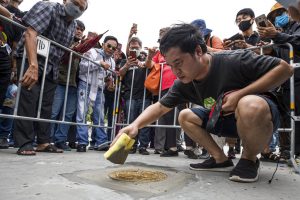Over the weekend, tens of thousands of people turned out in central Bangkok to press demands for far-reaching political reforms.
Gathering under leaden skies, demonstrators cheered calls for the resignation of Prime Minister Prayut Chan-o-cha and the drafting of a new constitution. They also renewed combustive calls for reforms of the Thai monarchy, a bastion of inherited wealth and privilege that has rarely been the target of public criticism.
The protests, which reached their height on Saturday and rolled into smaller gatherings on Sunday, were held at the campus of Thammasat University. A highly symbolic locale, the university has long been a center of student activism. It is also where left-wing student demonstrators were suppressed with brutal force by the police in October 1976.
On Saturday afternoon, protesters pushed their way into the adjacent Sanam Luang, a vast space in front of the Grand Palace on the Chao Phraya River. There, on Sunday, they cemented a golden plaque into the ground, declaring that Thailand belonged to the people and not to the monarchy. The plaque was engraved with the words, “At this place the people have expressed their will: that this country belongs to the people and is not the property of the monarch as they have deceived us.”
The plaque was designed to replace another that was removed in April 2017. The missing plaque commemorated the 1932 Revolution that ended the absolute monarchy and produced Thailand’s first constitution, and has since been replaced by a plaque bearing a royalist slogan.
“The nation belongs to no one person but to all of us,” said protest leader Parit “Penguin” Chiwarak, during a ceremony marking the plaque’s installation. “Down with feudalism, long live the people.”
The accelerating Thai protests have been pushed by a basket of grievances, from the economic aftershocks of the COVID-19 pandemic to the government’s outlawing of the popular Future Forward Party in February.
But they have also given voice to a deeper struggle that has rumbled beneath the surface of Thai politics since the 1932 Revolution: a struggle between those advocating more popular sovereignty, and a traditional elite claiming a moral right to rule. Sitting at the heart of this struggle is the vexed question of what political role (if any) the Thai monarchy should play.
The monarchical taboo was breached for the first time at demonstrations in July and August, when protest leaders officially unveiled 10 demands for the reform of the monarchy. This has exposed them to prosecution under Thailand’s lèse majesté law, which carries prison terms of up to 15 years.
The Thai monarchy has begun to draw more criticism since the accession of the erratic King Vajiralongkorn in 2016. Lacking the moral stature of his late father Bhumibol Adulyadej, who held the throne for seven decades, Vajiralongkorn has attracted considerable scorn for his recent behavior, from his inaction during the COVID-19 pandemic, which he spent at a luxury hotel in the Bavarian alps, to the royal family’s lavish spending. At the same time, the new King has tightened his grip on power, personally assuming control of the monarchy’s vast wealth, and extending his control over the military.
The government is unlikely to give ground. By early Monday, the protesters’ plaque had been dug up and removed and the authorities have shown little hint of compromise. The weekend’s protests took place under the watch of more than 8,000 police officers, a reminder that Thailand’s elites have often been willing to employ violence to quash calls for greater popular sovereignty.
But the demonstrations show no signs of flagging. Student-leaders say they have planned another rally for September 24, a provocative choice given that this is the date of an important royalist holiday. Protesters are also planning a general strike on October 14 to keep up the pressure on Prayut’s government. Amid the economic fallout from COVID-19, Thailand’s royalist establishment, and its youthful but increasingly broad-based protest movement, are on course for a collision that could shape Thai politics for many years to come.

































